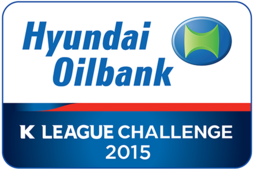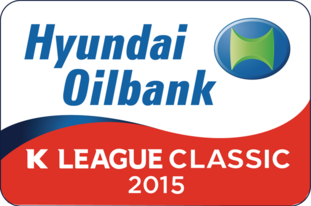First round
| Jeonnam Dragons | 0–1 | Busan Daewoo Royals |
|---|---|---|
| Report | Ryu Woong-yeol |
| Tournament details | |
|---|---|
| Host country | South Korea |
| Dates | 17–31 October 1999 |
| Teams | 4 |
| Final positions | |
| Champions | Suwon Samsung Bluewings |
| Runners-up | Busan Daewoo Royals |
| Tournament statistics | |
| Matches played | 5 |
| Goals scored | 9 (1.8 per match) |
| Attendance | 110,489 (22,098 per match) |
| Top scorer(s) | Ryu Woong-yeol (2 goals) |
The 1999 K League Championship was the sixth competition of the K League Championship, and was held to decide the 17th champions of the K League. It was contested between the top four clubs of the regular season. The first round was played as a single match between third place and fourth place of the regular season. The winners of the first round advanced to the semi-final, and played against runners-up of the regular season over two legs. The winners of the regular season directly qualified for the best-of-three final.
| Pos | Team | Pld | W | WG | WP | L | GF | GA | GD | Pts | Qualification |
|---|---|---|---|---|---|---|---|---|---|---|---|
| 1 | Suwon Samsung Bluewings | 27 | 18 | 2 | 1 | 6 | 56 | 24 | +32 | 59 | Qualification for the playoffs final |
| 2 | Bucheon SK | 27 | 11 | 7 | 0 | 9 | 48 | 39 | +9 | 47 | Qualification for the playoffs semi-final |
| 3 | Jeonnam Dragons | 27 | 9 | 3 | 5 | 10 | 43 | 38 | +5 | 38 | Qualification for the playoffs first round |
| 4 | Busan Daewoo Royals | 27 | 10 | 3 | 1 | 13 | 37 | 36 | +1 | 37 |
| First round | Semi-final | Final | |||||||||||||||||
| 2 | Bucheon SK | 0 | 0 | 0 | |||||||||||||||
| 3 | Jeonnam Dragons | 0 | 1R | Busan Daewoo Royals | 1 | 1 | 2 | ||||||||||||
| 4 | Busan Daewoo Royals | 1 | SF | Busan Daewoo Royals | 1 | 1 aet | X | 0W | |||||||||||
| 1 | Suwon Samsung Bluewings | 2 | 2 aet | X | 2W | ||||||||||||||
| Jeonnam Dragons | 0–1 | Busan Daewoo Royals |
|---|---|---|
| Report | Ryu Woong-yeol |
| Bucheon SK | 0–1 | Busan Daewoo Royals |
|---|---|---|
| Report | Woo Sung-yong |
| Busan Daewoo Royals | 1–0 | Bucheon SK |
|---|---|---|
| Manić | Report |
Busan Daewoo Royals won 2–0 on aggregate.
| Busan Daewoo Royals | 1–2 | Suwon Samsung Bluewings |
|---|---|---|
| Ryu Woong-yeol | Report |
|
| Suwon Samsung Bluewings | 2–1 (a.e.t.) | Busan Daewoo Royals |
|---|---|---|
| Report | Lee Ki-boo |
Suwon Samsung Bluewings won the series 2–0.
| Pos | Team | Qualification | |
|---|---|---|---|
| 1 | Suwon Samsung Bluewings (C) | Qualification for the Asian Club Championship | |
| 2 | Busan Daewoo Royals | ||
| 3 | Bucheon SK | ||
| 4 | Jeonnam Dragons |
In 1999 season, There were two Korean League Cup competitions. One is Adidas Cup 1999 and the other is Daehan Fire Insurance Cup 1999.
This article is regarding Daehan Fire Insurance Cup 1999
The 2009 K League Championship was the 13th competition of the K League Championship, and was held to decide the 27th champions of the K League. The top six clubs of the regular season qualified for the championship. The winners of the regular season directly qualified for the final, and second place team qualified for the semi-final. The other four clubs entered the first round, and the winners of the second round advanced to the semi-final. Each match was played as a single match, excluding the final which consisted of two matches. Jeonbuk Hyundai Motors became the champions for the first time by defeating Seongnam Ilhwa Chunma 3–1 on aggregate in the final.
The 2007 K League Championship was the eleventh competition of the K League Championship, and was held to decide the 25th champions of the K League. The top six clubs of the regular season qualified for the championship. The winners of the regular season directly qualified for the final, and second place team qualified for the semi-final. The other four clubs entered the first round, and the winners of the second round advanced to the semi-final. Each match was played as a single match, excluding the final which consisted of two matches.
The 2006 K League Championship was the tenth competition of the K League Championship, and was held to decide the 24th champions of the K League. After the regular season was finished, the first stage winners, the second stage winners, and the top two clubs in the overall table qualified for the championship. Each semi-final was played as a single match, and the final consisted of two matches.
The 2004 K League Championship was the eighth competition of the K League Championship, and was held to decide the 22nd champions of the K League. After the regular season was finished, the first stage winners, the second stage winners, and the top two clubs in the overall table qualified for the championship. Each semi-final was played as a single match, and the final consisted of two matches.
The 2000 K League Championship was the seventh competition of the K League Championship, and was held to decide the 18th champions of the K League. It was contested between the top four clubs of the regular season. The first round was played as a single match between third place and fourth place of the regular season. The winners of the first round advanced to the semi-final, and played against runners-up of the regular season over two legs. The winners of the regular season directly qualified for the best-of-three final.
The 1998 K League Championship was the fifth competition of the K League Championship, and was held to decide the 16th champions of the K League. It was contested between the top four clubs of the regular season. The first round was played as a single match between third place and fourth place of the regular season. The winners of the first round advanced to the semi-final, and played against runners-up of the regular season over two legs. The final progressed in the same way as the semi-final, and winners of the regular season qualified directly.
The 2010 K League Championship was the 14th competition of the K League Championship, and was held to decide the 28th champions of the K League. The top six clubs of the regular season qualified for the championship. The winners of the regular season directly qualified for the final, and second place team qualified for the semi-final. The other four clubs entered the first round, and the winners of the second round advanced to the semi-final. Each match was played as a single match, excluding the final which consisted of two matches.
The 2011 K League Championship was the 15th and the last competition of the K League Championship. It was held to decide the 29th champions of the K League. The top six clubs of the regular season qualified for the championship. The winners of the regular season directly qualified for the final, and second place team qualified for the semi-final. The other four clubs entered the first round, and the winners of the second round advanced to the semi-final. Each match was played as a single match, excluding the final which consisted of two matches.
The 2011 Korea National League season was the ninth season of the Korea National League. The postseason playoff's teams were expanded by 6 teams and the playoffs were operated in the same format as the K-League Championship. In the 2011 season, Yesan FC withdrew from the league due to financial difficulties.
The 2008 K League Championship was the twelfth competition of the K League Championship, and was held to decide the 26th champions of the K League. The top six clubs of the regular season qualified for the championship. The winners of the regular season directly qualified for the final, and second place team qualified for the semi-final. The other four clubs entered the first round, and the winners of the second round advanced to the semi-final. Each match was played as a single match, excluding the final which consisted of two matches. Suwon Samsung Bluewings became the champions by defeating FC Seoul 3–2 on aggregate in the final.
The 2005 K League Championship was the ninth competition of the K League Championship, and was held to decide the 23rd champions of the K League. After the regular season was finished, the first stage winners, the second stage winners, and the top two clubs in the overall table qualified for the championship. Each semi-final was played as a single match, and the final consisted of two matches.

The 2015 K League Challenge was the third season of the K League Challenge, the second tier South Korean professional league for association football clubs, since its establishment in 2013. From the 2014 season, a top place team was promoted to the K League Classic and the promotion play-offs among three clubs ranked between 2nd and 4th took place after the regular season ends.

The 2015 K League Classic was the 33rd season of the top division of professional football in South Korea since its establishment in 1983 as K-League and the third season in its current name, the K League Classic.

The 2016 K League Challenge was the fourth season of the K League Challenge, the second tier South Korean professional league for association football clubs since its establishment in 2013. Top-ranked team gained promotion to the K League Classic and the promotion play-offs among three clubs ranked between 2nd and 4th place was held after the regular season ends.

The 2017 K League Challenge was the fifth season of the K League Challenge, the second tier South Korean professional league for association football clubs since its establishment in 2013. The top-ranked team and the winner of the promotion play-offs among three clubs ranked between 2nd and 4th got promoted to the K League 1 after the regular season ended.

The 2017 K League Classic was the 35th season of the top division of professional football in South Korea since its establishment in 1983 as K League and the fifth season in its current name, the K League Classic.
The 2018 K League 1 was the 36th season of the top division of professional football in South Korea since its establishment in 1983 as K League and the first season in its current name, the K League 1.
The 2019 K League 1 was the 37th season of the top division of professional football in South Korea since its establishment in 1983 as K League, and the second season under its current name, the K League 1.
The 2019 K League 2 was the seventh season of the K League 2, the second-tier South Korean professional league for association football clubs since its establishment in 2013, and the second one with its current name, the K League 2. The top-ranked team and the winners of the promotion play-offs among three clubs ranked between second and fourth got promoted to the 2020 K League 1.